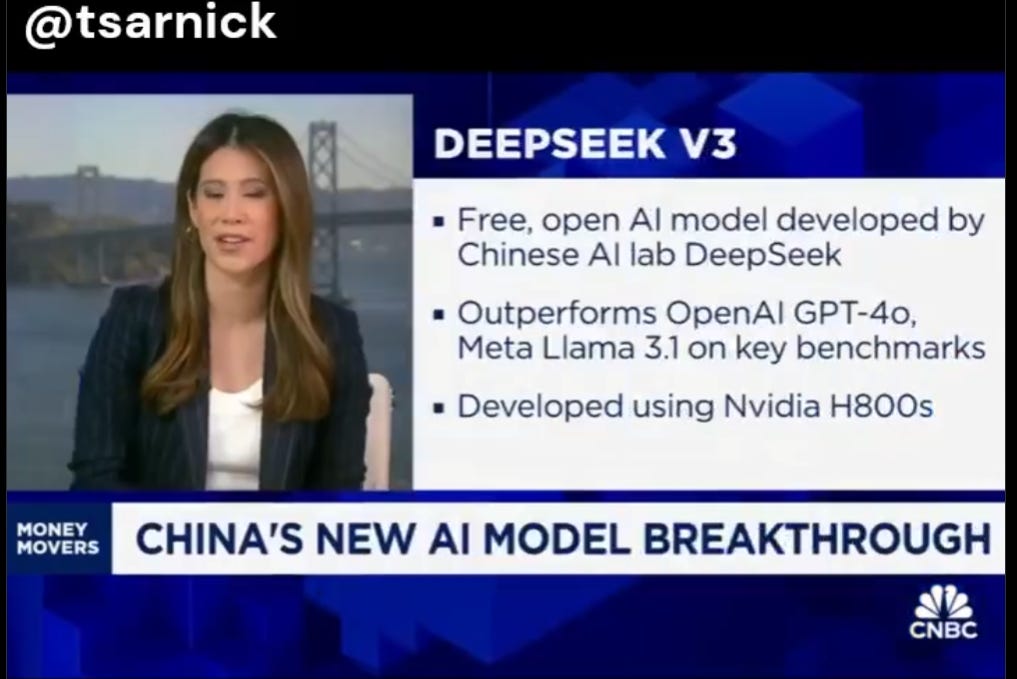Richard Whittle receives funding from the ESRC, Research England and was the recipient of a CAPE Fellowship.

Stuart Mills does not work for, speak with, own shares in or receive funding from any business or organisation that would benefit from this article, and has actually revealed no relevant affiliations beyond their academic visit.

Partners
University of Salford and University of Leeds offer funding as founding partners of The Conversation UK.
View all partners

Before January 27 2025, it's fair to state that Chinese tech business DeepSeek was flying under the radar. And then it came dramatically into view.
Suddenly, everybody was speaking about it - not least the investors and executives at US tech firms like Nvidia, Microsoft and Google, which all saw their business values topple thanks to the success of this AI startup research laboratory.
Founded by a successful Chinese hedge fund supervisor, the laboratory has taken a various approach to expert system. Among the major differences is cost.
The development costs for Open AI's ChatGPT-4 were stated to be in excess of US$ 100 million (₤ 81 million). DeepSeek's R1 model - which is used to create material, resolve logic problems and produce computer system code - was apparently used much less, less powerful computer system chips than the likes of GPT-4, resulting in expenses claimed (however unverified) to be as low as US$ 6 million.

This has both financial and geopolitical results. China goes through US sanctions on importing the most innovative computer system chips. But the fact that a Chinese startup has actually had the ability to develop such a sophisticated model raises questions about the effectiveness of these sanctions, cadizpedia.wikanda.es and whether Chinese innovators can work around them.
The timing of DeepSeek's brand-new release on January 20, as Donald Trump was being sworn in as president, indicated a challenge to US supremacy in AI. Trump reacted by explaining the moment as a "wake-up call".
From a financial perspective, the most visible impact may be on customers. Unlike competitors such as OpenAI, which recently started charging US$ 200 monthly for access to their premium designs, DeepSeek's comparable tools are currently totally free. They are likewise "open source", enabling anybody to poke around in the code and reconfigure things as they wish.
Low expenses of advancement and effective usage of hardware seem to have paid for DeepSeek this cost benefit, and have already required some Chinese competitors to reduce their rates. Consumers need to expect lower expenses from other AI services too.

Artificial financial investment
Longer term - which, in the AI industry, iwatex.com can still be incredibly soon - the success of DeepSeek might have a huge influence on AI investment.
This is since up until now, practically all of the huge AI companies - OpenAI, Meta, Google - have been struggling to commercialise their models and be lucrative.

Until now, this was not always an issue. Companies like Twitter and Uber went years without making profits, prioritising a commanding market share (lots of users) instead.
And business like OpenAI have actually been doing the exact same. In exchange for constant financial investment from hedge funds and other organisations, they guarantee to develop even more effective designs.
These models, the business pitch probably goes, will enormously enhance productivity and then profitability for organizations, which will end up delighted to pay for AI items. In the mean time, all the tech companies require to do is collect more data, buy more powerful chips (and more of them), and establish their designs for longer.
But this costs a lot of money.
Nvidia's Blackwell chip - the world's most effective AI chip to date - expenses around US$ 40,000 per system, and AI companies typically require 10s of countless them. But up to now, AI companies haven't truly had a hard time to draw in the required financial investment, even if the amounts are big.
DeepSeek might change all this.
By demonstrating that developments with existing (and maybe less sophisticated) hardware can achieve similar efficiency, it has provided a caution that tossing cash at AI is not guaranteed to pay off.
For instance, prior to January 20, it might have been presumed that the most sophisticated AI designs require enormous information centres and other facilities. This implied the similarity Google, Microsoft and OpenAI would deal with limited competitors since of the high barriers (the vast cost) to enter this market.
Money worries
But if those barriers to entry are much lower than everybody thinks - as DeepSeek's success recommends - then lots of huge AI investments suddenly look a lot riskier. Hence the abrupt effect on huge tech share prices.
Shares in chipmaker Nvidia fell by around 17% and ASML, which develops the machines required to produce innovative chips, also saw its share price fall. (While there has been a slight bounceback in Nvidia's stock rate, it appears to have settled below its previous highs, reflecting a new market reality.)

Nvidia and ASML are "pick-and-shovel" companies that make the tools needed to create an item, instead of the product itself. (The term originates from the idea that in a goldrush, the only individual ensured to make money is the one offering the picks and shovels.)
The "shovels" they offer are chips and chip-making equipment. The fall in their share rates originated from the sense that if DeepSeek's much cheaper method works, the billions of dollars of future sales that investors have actually priced into these business might not materialise.
For the similarity Microsoft, Google and Meta (OpenAI is not openly traded), the cost of structure advanced AI may now have fallen, indicating these companies will need to spend less to remain competitive. That, for them, could be a good idea.
But there is now question as to whether these business can effectively monetise their AI programmes.
US stocks make up a traditionally large portion of worldwide investment right now, and innovation companies make up a traditionally big percentage of the worth of the US stock exchange. Losses in this industry may force financiers to offer off other investments to cover their losses in tech, causing a whole-market recession.
And it should not have come as a surprise. In 2023, a dripped Google memo cautioned that the AI industry was exposed to outsider disruption. The memo argued that AI business "had no moat" - no security - against rival designs. DeepSeek's success may be the proof that this is true.








